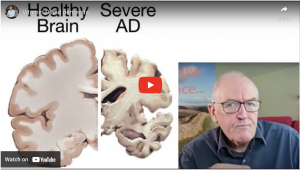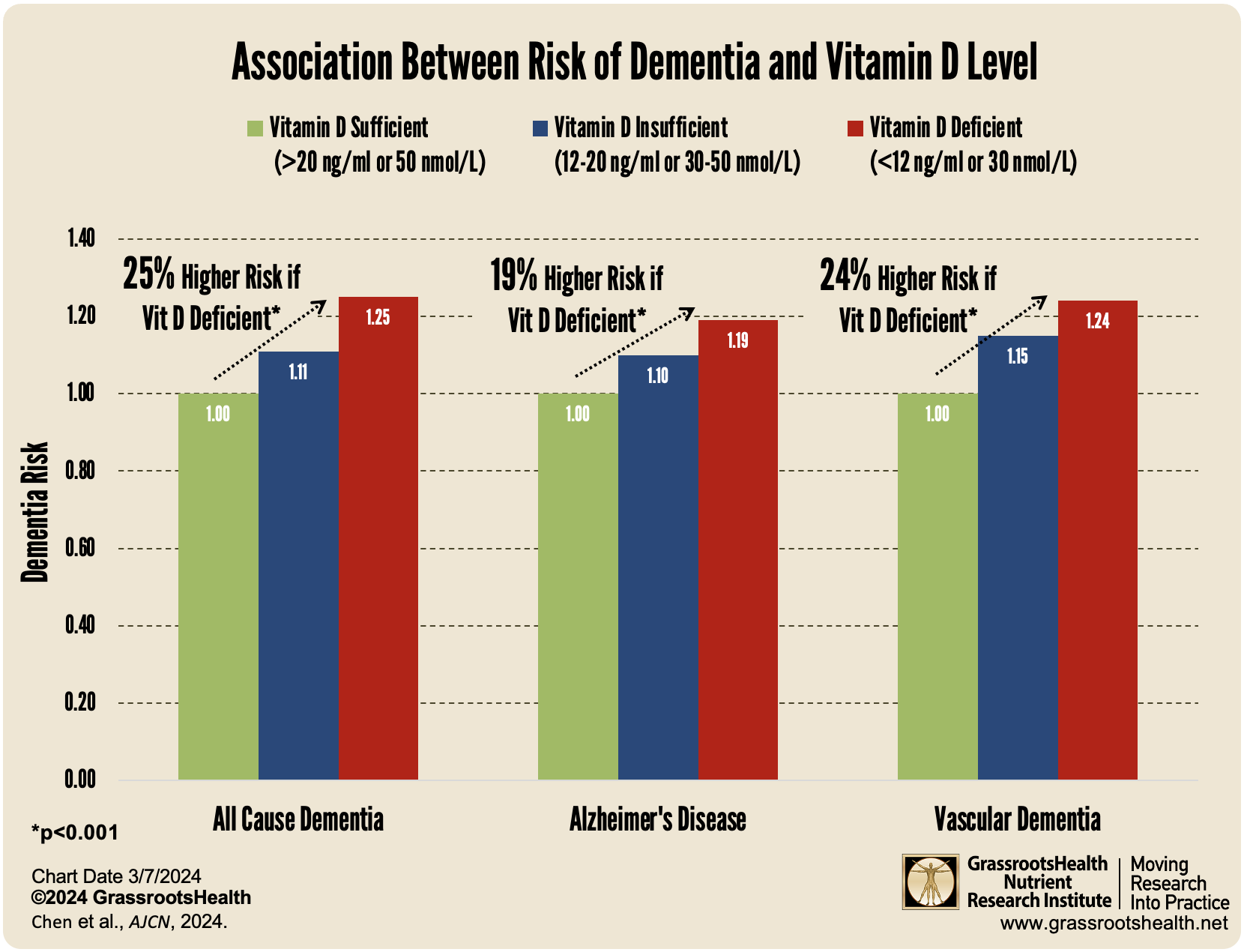Improve Brain Power and Mood with Sunshine and Vitamin D

From GrassrootsHealth
Check out the latest research on why getting sensible sun exposure and avoiding low vitamin D levels are each important for mental and emotional wellbeing
Key Points
- While getting enough vitamin D key to maintaining mental health, there are several other ways through which exposure to sunlight can boost our mood and benefit our mind, besides those related to sun-induced vitamin D production; exposure to sunlight also promotes the production of beta-endorphins, nitric oxide, melatonin, serotonin, and dopamine – all of which play important roles in mood
- Maintaining optimal vitamin D levels has been associated with a lower risk of depression, anxiety, sleep disorders, suicide risk, and cognitive disorders including dementia and Alzheimer’s Disease
- One study found that participants receiving higher amounts of sun exposure had higher average mental state scores of cognitive function compared to participants in the medium or low exposure groups; this study concluded that long-term high sun exposure throughout life could reduce the risk of cognitive impairment in the later years of life
Are You Getting Enough Vitamin D? Check Now! Use code SUNMONTH24 for 10% off during May 2024, plus get the Sunshine eBook for FREE with your test kit purchase.
 Research continues to show positive associations between increased lifetime sunshine exposure, higher vitamin D levels, and improved cognitive health and mental-emotional wellbeing. While getting enough vitamin D key to maintaining mental health, there are several other ways through which exposure to sunlight can boost our mood and benefit our mind, besides those related to sun-induced vitamin D production.
Research continues to show positive associations between increased lifetime sunshine exposure, higher vitamin D levels, and improved cognitive health and mental-emotional wellbeing. While getting enough vitamin D key to maintaining mental health, there are several other ways through which exposure to sunlight can boost our mood and benefit our mind, besides those related to sun-induced vitamin D production.
“Feel-Good” Chemicals Released in the Body Upon Exposure to Sunlight
Exposure to UVB from sunlight produces vitamin D, aka the “Sunshine Vitamin.” It also results in the release of beta-endorphins, which are naturally occurring opioids that promote mood enhancement, relaxation, and pain relief. Interestingly, studies such as that by Kemeny et al. have demonstrated how avoidance of sunshine and vitamin D deficiency could be a contributing factor to decreased pain relief and even increase the risk of opioid addiction.
Nitric oxide, which is produced upon exposure to UVA from sunlight, has been shown to reduce inflammation and oxidative stress, resulting in decreased anxiety and depression.
The release of melatonin and serotonin are also prompted with sun exposure, both of which are associated with sleep regulation, improved mood, and easing anxiety. A study by Kent et al. discussed how a lack of sunlight can result in altered serotonin levels, neurodegeneration, depression, and other cognitive deficits. The study showed how sunlight and light therapy can help with the regulation of both the melatonin and serotonin systems among patients with seasonal affective disorder (SAD), bipolar disorder, and schizophrenia, which may also be one of the mechanisms by which sunlight can affect Alzheimer’s disease, Parkinson’s disease, and sleep disorders.
Dopamine is another chemical in the body that is released upon exposure to sunshine. Dopamine, AKA the “feel-good neurotransmitter,” is known to boost mood and motivation, and is also linked to reduced depression and anxiety. A study evaluating the correlation between dopamine and sunshine by Tsai et al. found that dopamine receptor availability was significantly greater among participants with the highest amount of sunshine exposure compared to the lowest, indicating a sensitivity of the dopamine system to variations in the amount of sun exposure a person gets.
The Sunshine Vitamin is Essential to Emotional Well-being
Vitamin D itself plays an essential role in the health of the brain and nervous system and in the development of depression, and has been shown to have beneficial effects on depression, as well as stress, anxiety, and sleep. Several studies have demonstrated the effects that vitamin D supplementation and correcting vitamin D deficiency can have on depression and other mood disorders for individuals of all ages.
One study by Ataie-Jafari et al. looking at the association between vitamin D levels and mental health among 1095 children and adolescents found “significant associations between vitamin D deficiency and self-reported psychiatric distress as angriness, anxiety, poor quality sleep, sadness/depression, and worry.” Another study by Bahrami et al. found that vitamin D supplementation had significant reductions in all levels (mild, moderate, and severe) of depression among teenage girls.
A study among adult Canadians assessed the relationship between vitamin D levels and different indicators of mental health such as depression, anxiety, and stress. This study found that all measured indicators of mental health (emotional health, self-perceived mental health, self-perceived general health, and self-perceived stress) were positively associated with higher vitamin D levels.
Lastly, a 2023 study by Lavigne et al. examined the risk of suicide attempts and intentional self-harm among US Veterans who had either received vitamin D treatment or who had not received vitamin D treatment in the previous years. The study found that vitamin D supplementation was associated with a 45-48% lower risk of suicide attempt and self-harm; the higher the dose of vitamin D, the greater the risk reduction, with a greater risk reduction found among Black veterans compared to White veterans.
Vitamin D Called the “Low Hanging Fruit” for Addressing Dementia and Other Cognitive Health Disorders
Higher levels of vitamin D within the brain have been associated with lower risk of dementia and Alzheimer’s Disease, as well as better global cognitive function scores, a slower rate of cognitive decline, and better semantic and working memory.
A new study published this year (2024) by Chen et al. looked at data from 269,229 adults (ages 55 to 69 years old) to determine the relationship between vitamin D supplementation and vitamin D levels on the incidence of dementia over a 14-year period. Over half (52.3%) of the participants had vitamin D levels below 20 ng/ml (50 nmol/L), with 18.3% deficient (defined as below 12 ng/ml or 30 nmol/L) and 34% insufficient (between 12-20 ng/ml or 30-50 nmol/L). The chances of vitamin D deficiency and insufficiency were lower among those taking supplements, however, vitamin D deficiency still occurred among 6.9% of those taking vitamin D and 9.5% of those taking multivitamins, compared to 21.5% of those who did not supplement. The study found a 19-25% increased risk of dementia among those with vitamin D deficiency, and a 10-15% increased risk among those with vitamin D insufficiency. Findings for the increased risk among vitamin D deficient and insufficient participants were statistically significant for all three groups of dementia and remained significant when adjusting for variables.
Another study by Ghahremani et al. looked at data from 12,388 participants who were dementia free at the beginning of the study to determine the effect of prescribed vitamin D supplementation on the risk of developing dementia over the ten-year study period. They found a 40% decreased risk of developing dementia among those taking vitamin D supplements.
 This excellent video from Dr. John Campbell, titled “Vitamin D and Dementia,” reviews the findings from this study, and begins with a discussion of the high prevalence of vitamin D deficiency, which has remained an epidemic for decades despite how easy it is to prevent and treat. Yet another study discussed found that higher levels of vitamin D were linked to a 59% lower risk of developing Alzheimer’s Disease. Unfortunately, as Dr. Campbell points out in the video, there are also many studies of poor quality whose conclusions result in confusion among health practitioners and individuals about vitamin D, what levels to aim for, and how much to take. Read a summary of the video or watch it here.
This excellent video from Dr. John Campbell, titled “Vitamin D and Dementia,” reviews the findings from this study, and begins with a discussion of the high prevalence of vitamin D deficiency, which has remained an epidemic for decades despite how easy it is to prevent and treat. Yet another study discussed found that higher levels of vitamin D were linked to a 59% lower risk of developing Alzheimer’s Disease. Unfortunately, as Dr. Campbell points out in the video, there are also many studies of poor quality whose conclusions result in confusion among health practitioners and individuals about vitamin D, what levels to aim for, and how much to take. Read a summary of the video or watch it here.
Additional Ways Sunshine and UVB Exposure Have been Shown to Affect Mental Health
Lower Risk of Generalized Anxiety Disorder
Limited or minimized sunshine exposure has also been associated with and increased risk of generalized anxiety disorder (GAD). A 2022 study by Al Anouti et al. found such an association among female college students who practiced more sun avoidance habits that minimized their exposure to sunshine; in fact, the score used to assess sun exposure habits was a strong predictor of GAD status. The risk of GAD was also increased among women with a low dietary intake of vitamin D, and those with a history of vitamin D deficiency.
“The findings showed clear evidence that sun avoidance behaviors are strongly associated with an elevated risk of generalized anxiety disorder…”
Better Mood and Improved Sense of Wellbeing
Studies have correlated increased levels of interleukin-6 (IL-6) with major depressive disorder, and cortisol with immune and mood imbalances. A study by Toledo et al. found an improvement in mood and wellbeing with narrow-band UVB exposure. The study looked at whole-body exposure to narrow-band UVB and its impact on mood, as well as resulting levels of vitamin D, interleukin-6 (IL-6), cortisol, and beta-endorphins (B-END). Mood was scored based on satisfaction, tiredness, wellbeing and irritation, with higher scores representing worse moods. Participants experienced significant improvements in mood over the five days following NB UVB exposure. Both vitamin D and cortisol levels were correlated with the baseline mood state, and from beginning to end of the study, vitamin D levels increased while IL-6 levels decreased.
Improved Infant Motor Development and Postpartum Depression
A study by Zhang et al. found that infants receiving vitamin D (400 IU/day) plus sunlight had better motor development scores and lower cortisol levels over the next two months compared to infants only taking vitamin D supplements (400 or 1000 IU/day) or the control group. Infants in the highest sun exposure group (7-14 hours/week) achieved the best scores and had the lowest cortisol levels.
Further, mothers who received sunlight exposure had improved depression scores and lower cortisol levels compared to mothers who did not receive sunlight exposure. These findings indicate that sunlight and vitamin D supplements combined can improve motor development, lower cortisol levels, and improve depressive symptoms.
Seasonal Affective Disorder
One in ten Americans suffer from a recurring depression called Seasonal Affective Disorder (SAD) for which their symptoms often start in late fall or early winter when the days are short, and go away in the spring when the days lengthen. In other words, they feel better when there is more UVB available with sunlight. The risk is much higher for people who live further from the equator, where the length of the days varies more greatly throughout the year. Light therapy, exposure to artificial UVB lamps, has been shown to be an effective treatment for people with SAD, improving symptoms by 50-80%.
Reduced Risk of Cognitive Impairment
A study by Gao et al. looked at data from 1192 participants aged 60 years and older and residing in rural China who provided information about their long-term sun exposure behaviors including time of day when outdoors, duration outdoors, and use of sun protection. The research team used the Mini-Mental State Examination (MMSE; maximum score of 30) to assess participant’s orientation, memory, language, calculation, and attention. They found that participants in the high sun exposure group had higher average mental state scores of cognitive function compared to participants in the medium or low exposure groups. This study concluded that long-term high sun exposure throughout life could reduce the risk of cognitive impairment in the later years of life.
SmartTan.com news articles regularly report medical and scientific information to keep you abreast of current events related to UV light. This information is not intended to be used by any party to make unwarranted health claims to promote sunbed usage. Indoor tanning businesses are obligated to communicate a fair and balanced message to all clients about your products and services including the potential risks associated with indoor tanning. Contact your Smart Tan representative to find out more about what you can and can’t say in your tanning salon business.
© 2024 International Smart Tan Network. All rights reserved.

